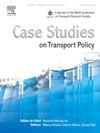Port operators’ perceptions and acceptance of maritime autonomous surface ships (MASS) operations: insights from Malaysia
IF 3.3
Q3 TRANSPORTATION
引用次数: 0
Abstract
Maritime autonomous surface ships (MASS) have emerged as a prominent topic, representing a novel technology pioneered by advanced nations. However, the surging interest in MASS in the shipping landscape of the future has prompted apprehension among port operators worldwide, with concerns spanning various domains, including port operations, safety and security, economic ramifications, workforce implications, legal and regulatory challenges, as well as marine technical and environmental considerations. This research aimed to explore the potential impacts of autonomous vessel operations on maritime ports, with a particular focus on the acceptance levels of major port operators in Peninsular Malaysia. A systematic multiphase mixed-methods approach was used to appropriately analyse the primary and secondary data obtained from a literature review, interviews, and questionnaire survey. Through these methodological avenues, the study identified 21 potential impacts of autonomous vessel operations on port operators. Among these, six key impacts garnered less acceptance from port operators regarding the integration of autonomous vessels into major ports. These impacts encompassed the risks associated with human error, concerns pertaining to insurance and liability, complexity in berth occupancy and port traffic management, the unpredictability of pollution, exploration of natural environments for port development, and the concomitant pressure on environmental preservation efforts. These insights provided a comprehensive overview of the key considerations essential for navigating the path towards integrating future autonomous vessel operations and facilitating development within the maritime industry in Malaysia and worldwide.
港口运营商对海上自主水面舰艇(MASS)运营的看法和接受度:来自马来西亚的见解
海上自主水面舰艇(MASS)代表着发达国家开创的一项新技术,已成为一个引人注目的话题。然而,未来航运领域对MASS的兴趣激增,引发了全球港口运营商的担忧,涉及各个领域,包括港口运营、安全和安保、经济影响、劳动力影响、法律和监管挑战,以及海洋技术和环境考虑。本研究旨在探索自主船舶运营对海上港口的潜在影响,特别关注马来西亚半岛主要港口运营商的接受水平。采用系统的多相混合方法对从文献综述、访谈和问卷调查中获得的主要和次要数据进行了适当的分析。通过这些方法途径,该研究确定了自主船舶操作对港口运营商的21个潜在影响。其中,在将自主船舶整合到主要港口方面,港口运营商对六个关键影响的接受程度较低。这些影响包括与人为错误有关的风险、与保险和责任有关的问题、泊位占用和港口交通管理的复杂性、污染的不可预测性、港口发展对自然环境的探索以及随之而来的对环境保护工作的压力。这些见解提供了对整合未来自主船舶操作和促进马来西亚乃至全球海运业发展的关键考虑因素的全面概述。
本文章由计算机程序翻译,如有差异,请以英文原文为准。
求助全文
约1分钟内获得全文
求助全文

 求助内容:
求助内容: 应助结果提醒方式:
应助结果提醒方式:


